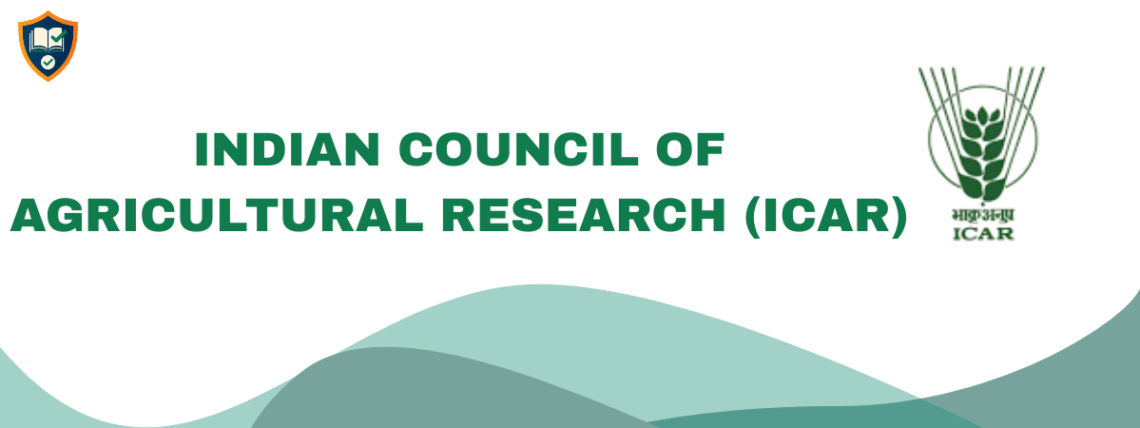ICAR leads agricultural science in India. It is based in New Delhi. It works under the Ministry of Agriculture & Farmers Welfare. ICAR plays a key part in farmer education and agricultural growth. KVKs focus on many fields. They include crop breeding, raising animals, fish farming, and eco-friendly agriculture. KVKs have played a big part in India’s Green Revolution. Because of research, training, and good policies run by ICAR, India has stayed ahead in the Green Revolution and food safety. For climate-smart farming and rural success, KVKs are necessary.
About the Indian Council of Agricultural Research – Key Facts
| Feature | Details |
| Name | Indian Council of Agricultural Research (ICAR) |
| Established | 1929 |
| Former Name | Imperial Council of Agricultural Research |
| Headquarters | New Delhi, India |
| Governing Body | Department of Agricultural Research & Education (DARE), Ministry of Agriculture & Farmers Welfare |
| Director General | Dr. Himanshu Pathak (current, 2025) |
| Institutions Under ICAR | 111+ research institutes & 71 agricultural universities |
| Krishi Vigyan Kendras | 700+ KVKs across India |
| Key Contributions | Green Revolution, crop variety development, farmer training |
| International Collaborations | FAO, CGIAR, and global agricultural research bodies |
| Official Website | https://icar.org.in |
Key Achievements
- Led the Green Revolution to achieve food self-sufficiency within the country.
- Introduced tens of thousands of new high-yielding and climate-resilient varieties of crops.
- Created a pan-India network of Krishi Vigyan Kendras to serve farmers with frontline training.
- Promoted India’s White Revolution (dairy) and Blue Revolution (fisheries) through reputed institutions.
- Led the way for using ICT tools and apps to provide farmers with advisory on the farm in real-time.
Education and Capacity Building
- Establishes curriculum frameworks and provides accreditation of agricultural universities in India.
- Provides National Talent Scholarships, fellowships and awards for students and researchers.
- Delivers advanced training programs with practical knowledge and summer schools for faculty and scientists.
- Promotes skill development in important emerging areas .
Funding, Grants & Projects
- Funds research programs in national institutes, SAUs, KVKs.
- Promotes public-private partnerships with institutions for agriculture-biotech and seed sectors.
- Operates and has good coordination with international agencies (e.g., FAO, CGIAR).
- Runs flagship schemes for advancement: National Agricultural Innovation Fund (NAIF), National Agriculture Science Fund (NASF), etc.
Impact on Rural Economy & Food Security
Impact on Rural Economy & Food Security
- Higher and rich productivity of crops has contributed to food grain self-sufficiency in India.
- Helps to uplift smallholder and marginal farmers through better practices and inputs.
- Encourages sustainability of agro-systems, climate smart agriculture, integrated farming systems.
- Contributes to enhanced poverty reduction, household livelihood security in rural areas.
Challenges & Future Priorities
- Increasing use of precision agriculture, AI, IoT in countryside areas.
- Dealing with climate change, not enough water, bad soil, bug outbreaks.
- Making sure less fortunate farmers have fair access to what they need, and up to date tools.
- Making connections stronger between studies and down to earth use.
- Supporting farmer to consumer selling, after crop technologies, agricultural ventures.
Education and Capacity Building
- India’s agricultural universities get curriculum standards and accreditation from them.
- Students and researchers get National Talent Scholarships, fellowships, and awards from them.
- Faculty and scientists get advanced training programs and summer schools from them.
- Skill development in new fields like agri-biotech, AI, and drone technology receives promotion from them.
Innovation & International Collaboration
- Collaborates with worldwide research groups like CGIAR on shared initiatives.
- Promotes collaboration between public and private sectors for agricultural projects.
- Aids start-ups and agricultural entrepreneurs through incubation centers and grants.
- Offers knowledge to less developed countries through South-South Cooperation.
Technology Transfer and Farmer Outreach
- Runs over 700 Krishi Vigyan Kendras as key extension centers.
- Holds field demonstrations, trials, and meetings between farmers and scientists.
- Delivers timely weather, pest, and market advice using mobile tech.
- Issues manuals and bulletins for farmers in different Indian languages.
Important Links – Indian Council of Agricultural Research
| ICAR Official Website | https://icar.org.in/ |
| Important Highlights | Click Here |
| Notifications | Click Here |
| Contact | Click Here |
Programme(s) offered
| Srl. No. | Programme/ Course offered | Domain/ General/ Optional Languages mapped to the Programmes mapped to the Programmes offered in column C | Eligibility for the programme |
| 1 | B. F. Sc. Bachelor of Fisheries Sciences, B.Sc. (Hons.) Agriculture, B.Sc. (Hons.) Horticulture, B.Sc. (Hons.) Forestry, B.Sc. (Hons.) Natural Farming, B.Sc. (Hons.) Sericulture, B.Sc. (Hons.) Community Science, B.Sc. (Hons) Food Nutrition and Dietetics, B.Sc. (Hons) Agribusiness Management, B. Tech. Agricultural Engineering, B. Tech. Dairy Technology, B. Tech. Food Technology, B. Tech. Biotechnology | 302-Agriculture 304-Biology/Biological Science/Biotechnology/Biochemistry 306-Chemistry 319-Mathematics/Applied Mathema | 1.Candidate should have passed the qualifying examination (12th Standard) with at least three subjects out of Physics, Chemistry, Mathematics, Biology and Agriculture/Inter-Agriculture as core courses. 2.Candidate(s) who appears in subject(s) different than the one which s(he) passed in 12th standard will not be considered for counselling / admission and will stand rejected. 3.The candidates must attempt only those subjects (at least 3 subjects) in the examination as per the choice given in the Application / Registration Form. Therefore, they must exercise the choice of subjects very carefully. Attempting subjects different than choices given in the application form will invite disqualification from counselling / admission process. 04.Many admitting universities have special conditions (like upper age limit, mandatory subject eligibility for a specific program, gender specific preference, etc.) for admission as per respective university statute. It will be the responsibility of the candidate(s) to inquire about such special conditions from University of his/her interest before filling up the online application form for CUET (ICAR-UG) 2025. 5.For further details related to qualification/eligibility criteria, please refer to Information Bulletin for CUET (ICAR-UG) 2025. |
FAQs – Indian Council of Agricultural Research
Ans. 16 July 1929 as Imperial Council of Agricultural Research.
Ans. It is located in New Delhi, India.
Ans. Department of Agricultural Research & Education (DARE), Ministry of Agriculture & Farmers Welfare
Ans. Coordinate, guide and manage research and education along with its extension in agriculture across India.
Ans. 700+ KVKs across the country.
Disclaimer
The above information is provided for student guidance. For accurate and updated admission details, eligibility, and CUET subject combinations, please refer to the official AMU website:
https://www.amu.ac.in and the NTA CUET portal:
https://cuet.nta.nic.in
We are not the official CUET or AMU website. Our goal is to simplify and compile information for easy access.



